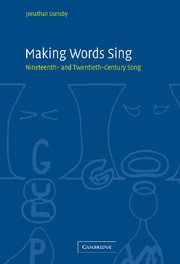Book contents
- Frontmatter
- Contents
- Acknowledgements
- Introduction
- 1 An introduction with no words, with intended words, and untheory
- 2 A love song: Brahms's ‘Von ewiger Liebe’
- 3 Boundless opulence: postscripts on Schoenberg's premonition
- 4 Interlude on peace, laws, flowers, and men flying
- 5 To Amherst via Vienna
- 6 By way of brief conclusion
- Bibliography
- Index
6 - By way of brief conclusion
Published online by Cambridge University Press: 23 November 2009
- Frontmatter
- Contents
- Acknowledgements
- Introduction
- 1 An introduction with no words, with intended words, and untheory
- 2 A love song: Brahms's ‘Von ewiger Liebe’
- 3 Boundless opulence: postscripts on Schoenberg's premonition
- 4 Interlude on peace, laws, flowers, and men flying
- 5 To Amherst via Vienna
- 6 By way of brief conclusion
- Bibliography
- Index
Summary
At an early stage of this argument and exegesis I expressed dissatisfaction with Lawrence Kramer's idea of ‘songfulness’ (see p. 5), not because it is a bad idea, which would hardly be likely of such an imaginative and thoughtful critic, but because it is too complex. Kramer's ‘just singing’, as will have been inferred almost incidentally when examining Stripsody (see pp. 107–14), is an idealized, formulaic, reductionist comforter of a thought, not a serious proposition susceptible to extrapolation through an evidence-based study of actual songs. Kramer's desire to demystify vocality by restoring it out of the clutches of arcane, positivist scholarly dissection to the pure and simple experience of genius at work is as laudable now as its more authoritative version was more than two millennia ago, when Plato asked us to realize that we perceive through the eye of the mind, as he would have it, and not through the highways and byways of sophisticated verbal reasoning and rhetoric; perception, in its simplest form, is a matter of immediate recognition, not of forensic analysis. But signification does not come in convenient packets. What we hear in a performance of a song is also what we brought to that performance from our experience, what we remember of it, and what it will become. This is actually the most obvious single challenge to music analysis, and even more of a challenge to that very poor relation of analysis, music criticism: how do you know what you will say about a piece of music tomorrow? It does not mean that one must throw in the towel and give up entirely on having the confidence to say anything at all about music, but it does mean that one ought to have good reason and good evidence.
- Type
- Chapter
- Information
- Making Words SingNineteenth- and Twentieth-Century Song, pp. 140 - 142Publisher: Cambridge University PressPrint publication year: 2004

